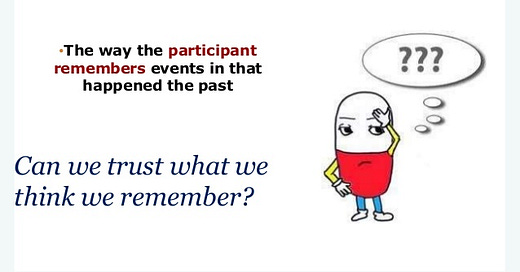Hey, there.
Today, we will be talking about the Recall Bias.
What is it?
In recall bias, the disease status of subjects affects their likelihood of reporting the exposure.
Examples -
For example, a patient with cancer may be more likely to recall being a smoker. In schizophrenia research, the disease status may reduce the likelihood that the sufferer will recall an exposure.
Where does it occur?
Recall bias occurs when participants in a study are systematically more or less likely to recall and relate information on exposure depending on their outcome status, or to recall information regarding their outcome dependent on their exposure.
Why do I need to know?
To minimize recall bias, some clinical trials have adopted a "wash out period", i.e., a substantial time period that must elapse between the subject's first observation and their subsequent observation of the same event.
Use of hospital records rather than patient experience can also help to avoid recall bias. Standardising sampling methods can help to avoid needing recall information in the first place.
Takeaways: -
Participants sometimes won’t give you the right details of a past event.
References & Studies: -
https://www.sciencedirect.com/topics/neuroscience/recall-bias
Learn Neuroscience with like-minded individuals. Join the lesson club!
Looking for previous issues? Take a look at Archives.




